An innovative tool designed for quick and efficient electrical diagnostics without the need for ground wires or clips. Ideal for testing DC circuits ranging from 3V to 30V. Computer safe.
- No earth lead required - simply touch your body to ground, in order to complete the circuit.
- Dual colour LED indicates Ground (green) or Power (red).
- Suitable for 6V | 12V | 24V systems.
- Internal lithium battery (ER14250) included
| SKU | ET3430 |
| Barcode # | 9321280428522 |
| Brand | Automotive |
| Product weight | 0.2000kg |
| Shipping weight | 0.200000kg |
12 Months
More from this category
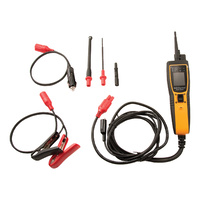
Automotive Circuit Tester
Advanced multi function tester supplied with inter changeable connectors. Voltage supply 8-30V.
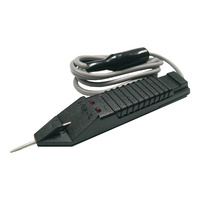
Automotive Circuit Tester | 3-48V
A handheld diagnostic tool designed to test circuits / electrical connections.Operates from 3-48V. Includes probe adaptor for testing terminal connections.
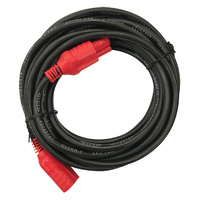
Automotive Circuit Tester 6m Extension Cable
An extension cable for the ET0700. Ideal for working on trucks/rear of vehicle.
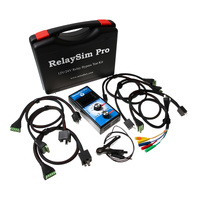
CarScope RelaySIM Pro Kit
The perfect electrical circuit test assistant! Get the job done with ease!
Compatible with standard 4 and 5 terminal relay circuits and can be used with most car makes and models. The RelaySim Pro can energise any relay that powers DC electric motors, fuel pumps, cooling fans, blower motors, window motors, and any other motor actuated by a relay), headlights, and other car lighting applications or almost all electrical actuators, such as electromagnetic, electromechanical, and electrohydraulic. Additionally, it can be used in series (in place of a fuse) with most other circuits rated for 25A or less. The device is suitable for both 12-volt and 24-volt systems and does not limit the operating current range. The operating range for continuous usage is up to 21 amps. The device supports a maximum surge of 27 amps, regardless of whether the voltage is 12V or 24V. Two LEDs (85 and 86 terminals) indicate voltage, polarity, and continuity in the relay coil circuit.RelaySim Pro has a built-in dual high-definition LCD digital display that allows you to observe the current and voltage values in the circuit under test. The device measures the current flowing through the 87 or 87a circuit, depending on which one is currently activated. Also, it measures and displays voltage for circuits 85, 86, 87, 87a, and 30. You can directly observe the amperage and voltage going into an activated circuit, allowing you to assess the load's health. If an actuator is drawing more current than specified, or the current load is inconsistent during operation, the load/actuator is suspect and should be replaced.
- Suits 12V and 24V applications
- Separate control of the 87 and 87a relay circuit
- Integrated a dual high-definition LCD digital display
- Built-in DC ampere meter 0...50A
- Up to 21 amp operating current (for both 12V and 24V applications. See the specs for more details)
- Measurement of the current through the activated circuit
- Built-in DC voltage meter 0...199.9V
- Independent voltage measurement on each relay terminal
- Open load detection in OFF-state
- Flags a fail event (Status LED)
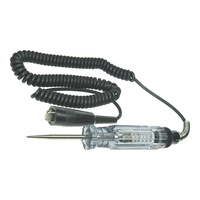
Circuit Tester 6V | 12V
Check circuits on all 6V & 12V systems. 70mm insulated probe, with 3.6m retractable cord.
- 70mm insulated probe
- 3.6m retractable cord
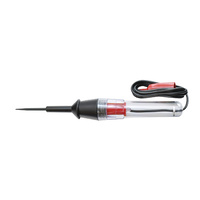
Computer Safe Circuit Tester
This circuit tester is designed for sensitive circuits such as injector pulse, and automotive computer circuits.
Operates from 3-15V (for 6 - 12V systems). Handle glows red for positive polarity, and green for negative polarity. Supplied with 48" ground wire.
- 3 - 15V voltage range
- 75mm probe length


